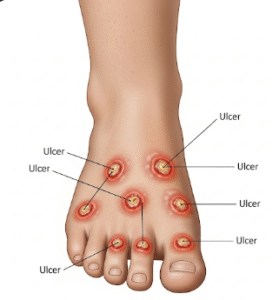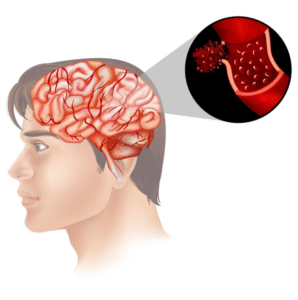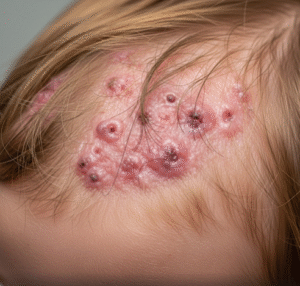Overview
A tooth abscess is a localized collection of pus caused by a bacterial infection within the tooth, gums, or surrounding bone. It is a painful dental condition that can result from untreated cavities, gum disease, or trauma. If left untreated, a tooth abscess can lead to serious complications, including the spread of infection to other parts of the body. South Korea offers advanced dental care for managing tooth abscesses, including precise diagnostics, root canal therapy, surgical drainage, antibiotics, and comprehensive oral rehabilitation to restore dental health and prevent recurrence.
What is a Tooth Abscess?
A tooth abscess is an accumulation of pus resulting from a bacterial infection in the tooth’s pulp, surrounding periodontal tissue, or jawbone. Abscesses are categorized based on their location:
- Periapical abscess: Occurs at the tip of the tooth root, typically due to untreated tooth decay.
- Periodontal abscess: Develops in the gums next to a tooth, often linked to gum disease or injury.
- Gingival abscess: Confined to the gum tissue without affecting the tooth or periodontal ligament.
A tooth abscess is considered a dental emergency due to the risk of severe pain, swelling, and systemic infection if not promptly treated. Early intervention in Korean dental clinics ensures effective management and minimal long-term damage.
Symptoms
Tooth abscess symptoms vary based on the location and severity of the infection:
- Severe, persistent toothache: Often throbbing and radiating to the jaw, ear, or neck
- Swelling: In the gums, face, or jaw near the affected tooth
- Redness and tenderness: Inflamed gum tissue surrounding the abscess
- Pus drainage: Foul-tasting fluid may ooze into the mouth
- Sensitivity: Pain when chewing or biting, or sensitivity to hot and cold
- Fever and malaise: Indicating systemic infection
- Swollen lymph nodes: Particularly in the neck
- Difficulty swallowing or breathing: In severe, untreated cases
Prompt recognition of these symptoms is crucial for early treatment and to prevent complications.
Causes
A tooth abscess usually arises from bacterial invasion following dental or periodontal issues:
- Untreated cavities: Deep decay reaching the tooth pulp allows bacterial infection.
- Gum disease: Advanced periodontitis can lead to periodontal abscesses.
- Dental trauma: Cracks, chips, or injury may permit bacterial entry.
- Failed dental procedures: Inadequate root canal treatment or fillings may predispose to abscess formation.
- Immune compromise: Conditions like diabetes, chemotherapy, or chronic illness increase susceptibility.
Bacteria such as Streptococcus species and anaerobic organisms are commonly responsible for abscess formation.
Risk Factors
Certain individuals are more likely to develop a tooth abscess:
- Poor oral hygiene and infrequent dental check-ups
- High-sugar diets that increase cavity risk
- History of periodontal disease or chronic gum problems
- Previous dental trauma or procedures
- Smoking, which impairs gum health and healing
- Weakened immune system due to chronic illness or medications
Awareness of these risk factors helps in preventive care and early intervention.
Complications
Untreated tooth abscesses can lead to serious health issues:
- Spread of infection: To the jawbone, neck, or head, causing osteomyelitis or cellulitis
- Sepsis: Systemic infection that can become life-threatening
- Tooth loss: Damage to the tooth structure or supporting bone
- Sinus involvement: Maxillary abscesses can spread to sinus cavities
- Difficulty breathing or swallowing: In severe infections affecting the airway
- Chronic dental pain and dysfunction: Affecting chewing and quality of life
Early dental care in Korea, including drainage and antibiotic therapy, prevents these complications.
Prevention
Preventing tooth abscess involves proper oral hygiene and regular dental care:
- Brush teeth at least twice daily with fluoride toothpaste
- Floss regularly to remove food debris and plaque between teeth
- Maintain routine dental check-ups and cleanings
- Treat cavities and gum disease promptly to prevent progression
- Limit sugary foods and beverages that promote bacterial growth
- Avoid tobacco use to support gum health and immune function
Treatment Options in Korea
South Korea offers advanced dental treatment for tooth abscess, combining modern technology with skilled clinical expertise:
Diagnosis:
- Clinical examination of teeth and gums
- Dental X-rays to identify the abscess location and assess bone involvement
- Pulp vitality tests to determine tooth health
- CT scans in severe or complex cases
Medical Treatments:
- Antibiotics: To control bacterial infection and prevent spread
- Pain management: Analgesics and anti-inflammatory medications
Dental Procedures:
- Root canal therapy: Removing infected pulp tissue and sealing the tooth to preserve function
- Incision and drainage: Surgical procedure for large abscesses to release pus and reduce swelling
- Tooth extraction: If the tooth is severely damaged or cannot be saved
- Periodontal therapy: Cleaning and treatment for gum-related abscesses
Rehabilitation and Support:
- Post-treatment care with proper oral hygiene, pain management, and diet modifications
- Follow-up visits to ensure complete healing and prevent recurrence
- Dental restoration procedures such as crowns or bridges to restore function and aesthetics
Korean dental clinics emphasize comprehensive care, combining prompt treatment, advanced procedures, and patient education to manage tooth abscess effectively and minimize recurrence.













